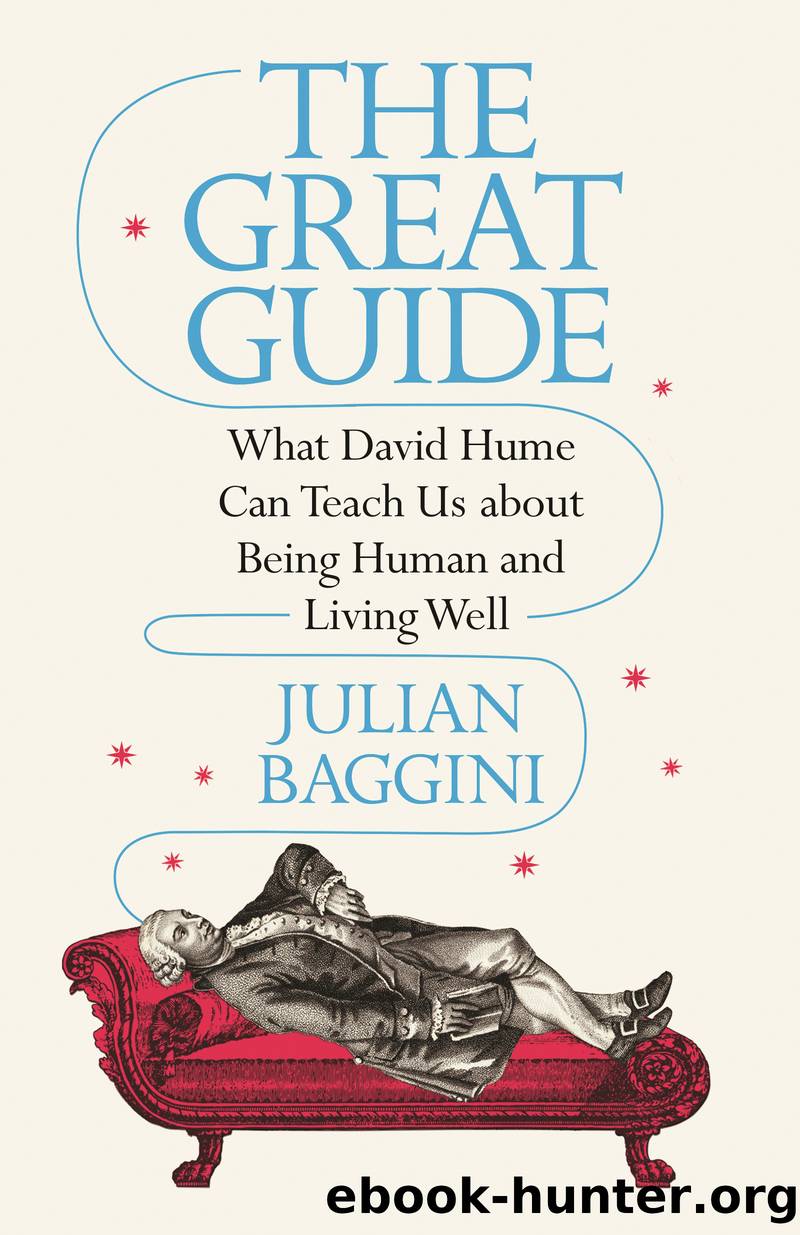The Great Guide by Julian Baggini

Author:Julian Baggini
Language: eng
Format: epub
Publisher: Princeton University Press
Published: 2021-03-18T00:00:00+00:00
Le bon David
Lord Hertford and his entourage left London on October 13, 1763, setting sail from Dover the following day. Because of a strong southeasterly wind, they had to land in Boulogne instead of Calais.27 Once again, it seems Hume, a poor sailor, was unfortunate in his channel crossing.
In Paris, Hume was received with adulation. After just three days in the capital and two at the royal palace in Fontainebleau, thirty-five miles south of central Paris, he wrote to Smith, âI have every where met with the most extraordinary Honours which the most exorbitant Vanity couâd wish or desire.â28 In another letter to Adam Ferguson two weeks later, still with the royal court at Fontainebleau, he reported with a combination of pride and embarrassment that âthe Royal Family downwards seem to have it much at heart to persuade me, by every expression of esteem, that they consider me as one of the greatest geniuses in the world.â29 Although he seemed to take some satisfaction in this, he was also genuinely troubled by what Mossner calls the âindiscriminate flatteryâ heaped upon him and the relentless schedule of large social gatherings. âI suppose this, like all other violent Modes, will pass,â he wrote wearily, âand in the mean while, the Hurry & Dissipation, attending it, gives me more pain than Pleasure.â30 In March 1764 he would look back and regret that âI allowd myself at first to be hurryâd into too great a Variety of Company, and find a Difficulty to withdraw and confine myself to one Society, without which there is no real Enjoyment.â31
Hume also struggled with his French, which had never been fluent in the first place. Such was the inadequacy of his linguistic skills that he worried they were not sufficient for his job and considered resigning his post. But he found it soon came back, while the errors and Scots accent that remained only seemed to endear him to the adoring French.32 Despite his Francophilia, Hume never fully mastered the language. Mossner says, âEven in later life, Humeâs conversational French was not fluent, and he always retained a Scottish burr which either disgusted or delighted the listener.â33
Soon, it seems, the balance of pain and pleasure had tipped decisively toward the positive. He managed to narrow his social circle to people he found most agreeable, ridding himself of the âsilly, distant admiration.â The result was blissful. âI eat nothing but Ambrosia, drink nothing but Nectar, breathe nothing but Incense, and tread on nothing but Flowers.â34 By November 23 he could tell his friend Rev. Wedderburn, âI daily reconcile myself more to this place, and expect soon to be a Parisian.â35 He was still as enthusiastic in June 1764 when he reported, âI continue to live here in a manner amusing enough, and which gives me no time to be tirâd of any Scene. What between public Business, the Company of the learned and that of the Great, especially of the Ladies, I find all my time fillâd up.â36
His admiration
Download
This site does not store any files on its server. We only index and link to content provided by other sites. Please contact the content providers to delete copyright contents if any and email us, we'll remove relevant links or contents immediately.
| Africa | Americas |
| Arctic & Antarctica | Asia |
| Australia & Oceania | Europe |
| Middle East | Russia |
| United States | World |
| Ancient Civilizations | Military |
| Historical Study & Educational Resources |
Magic and Divination in Early Islam by Emilie Savage-Smith;(1538)
Papillon by Henry Charrière(1444)
Bohemians, Bootleggers, Flappers, and Swells: The Best of Early Vanity Fair by Bohemians Bootleggers Flappers & Swells- The Best of Early Vanity Fair (epub)(1423)
Ambition and Desire: The Dangerous Life of Josephine Bonaparte by Kate Williams(1395)
Twelve Caesars by Mary Beard(1324)
What Really Happened: The Death of Hitler by Robert J. Hutchinson(1167)
Operation Vengeance: The Astonishing Aerial Ambush That Changed World War II by Dan Hampton(1164)
London in the Twentieth Century by Jerry White(1149)
The Japanese by Christopher Harding(1136)
Time of the Magicians by Wolfram Eilenberger(1132)
Twilight of the Gods by Ian W. Toll(1123)
Lenin: A Biography by Robert Service(1080)
The Devil You Know by Charles M. Blow(1029)
A Social History of the Media by Peter Burke & Peter Burke(988)
Freemasons for Dummies by Hodapp Christopher;(966)
Napolean Hill Collection by Napoleon Hill(949)
Henry III by David Carpenter;(925)
The Rise and Triumph of the Modern Self by Unknown(923)
Richard III (The English Monarchs Series) by Charles Ross(914)
